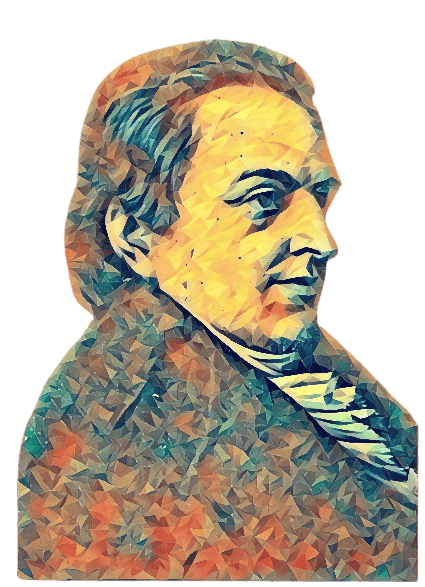Johann Gottlieb Fichte: Who he was and what he taught us
Johann Gottlieb Fichte was a seminal figure in German philosophy. His work forms a critical bridge between the ideas of his predecessors such as Immanuel Kant and the later developments of German idealism, particularly in the philosophies of Schelling and Hegel. Born in Rammenau, Saxony, in 1762, Fichte began his intellectual journey in the pastoral landscapes of Lutheran Germany, but soon catapulted himself to the center of the philosophical revolution.
Fichte's philosophy is best known for his rigorous development of the theory of subjectivity and the concept of the self. His "Wissenschaftslehre", first published in 1794, aimed to refine Kant's critical philosophy by seeing the ego - or self-conscious subject - as the basis of all human experience and reality. This bold and revolutionary idea states that the ego not only passively perceives an already existing world, but actively constructs it through its own processes.
Fichte was a philosopher of freedom and emphasized that the individual is not only bound by moral law, but also creates his own existence through acts of will. His ideas on national identity and political commitment also had a major influence on the development of nationalism in Germany and throughout Europe, making him a thinker who was concerned not only with abstract metaphysical systems, but also with pressing social and political issues.
Throughout his career, Fichte was both admired and opposed, not least because he challenged established religious and social norms. His tenure at the University of Jena ended with accusations of atheism - a serious charge in a deeply religious society. Nevertheless, his academic and public lectures, which he also held in Berlin until his death from a typhoid epidemic in 1814, continued to attract many people and motivated intellectual and cultural discussions.

Fichte's contributions to philosophy influenced many others. His concepts and ideas formed the framework for much of nineteenth-century continental philosophy. His emphasis on the active, creative self formed the basis for existential and phenomenological dialogues in the centuries that followed, influencing not only philosophy but also literature, psychology and political theory. Studying Fichte's works thus offers a fascinating insight into the dynamic and transformative nature of philosophy in reshaping our understanding of ourselves and our world.
In the modern world, Johann Gottlieb Fichte's philosophy resonates strongly in the areas of personal development, education and civic responsibility - albeit usually rather unconsciously. His emphasis on the active role of the individual in shaping their reality and circumstances is echoed in contemporary movements that prioritize self-empowerment and personal action. The idea that we construct our own experiences through our perceptions and actions is echoed in modern psychological practices such as cognitive behavioral therapy, which also assumes that changing one's thoughts can lead to a change in behavior and feelings.
Fichte's educational theories, set out primarily in his "Speeches to the German Nation" during the Napoleonic occupation of Berlin, proposed that education should be a means of developing individual character and instilling a sense of national identity and purpose. These ideas influence educational philosophies today that emphasize the development of critical thinking and moral responsibility. His vision of a "national education" designed to foster a collective identity and a communal ethic can be compared to modern educational reforms designed to prepare citizens to actively engage in democratic societies.
Furthermore, Fichte's concept of self-constitution and autonomy provides a philosophical basis for the modern emphasis on the rights and freedoms of the individual in the legal and political sphere. The principle that the individual is not only subject to the laws, but participates in their creation, is consistent with contemporary democratic ideals that value active citizenship and participatory governance.
Fichte's ideas also extend to debates about national identity in an increasingly globalized world. His reflections on nationalism, which was originally intended to unite and uplift communities, invite us to consider how these concepts need to be re-evaluated today in order to promote inclusivity and respect for multicultural values. However, it is precisely when considering nationalism that Fichte is often criticized, and not entirely unfounded. But other areas of his work are also described by some as "problematic". We have a separate article that highlights these points.
Although Fichte's philosophy is rooted in late 18th and early 19th century German idealism, it continues to influence and inspire discussions about how we understand ourselves, our responsibilities and our potential to shape our societies. His legacy challenges us to reflect on the role of the individual in continuously shaping the self and society in an interconnected and rapidly changing world.







